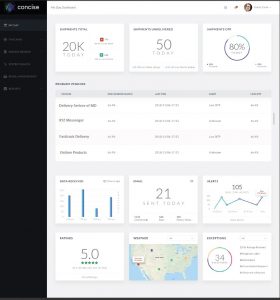Moving Away from FedEx and UPS
Why Large-Volume Shippers Should Consider Moving Away from FedEx and UPS
National shipping costs reached $1.5 trillion in 2017, and that number will continue to rise. FedEx and UPS still control the industry. And while this bodes well for familiarity, their domination of the supply chain means they can get away with rate hikes, added fees, and an overall lack of innovation. Even though they’ve had a lock on the industry for years, large-volume shippers should not shy away from considering the advantages of local and regional shipping carriers.
What are local & regional shipping carriers?
FedEx and UPS are the main national carriers. They deliver anywhere in the country, with massive fleets and huge warehouses. Below them are regional carriers, operating in specific geographic regions. They have smaller fleets and usually have routes of less than 500 miles.
Local carriers generally have fewer than 10 trucks, operating within an 80-100 mile range known as their commercial zone, as established by the Surface Transportation Board (STB).
Of the 700,000 active carriers in the US, 90.2% operate 6 or fewer trucks and 97.2% operate less than 20 trucks. With so many local and regional carriers, almost any large-volume shipper can create a shipping network that works with their business.
Benefits of local and regional carriers

Cost
The greatest appeal for large-volume shippers is the significant price reduction that local carriers can offer. In addition to lower flat fees, local and regional carriers have fewer added fees because they’re not regulated by a national shipping company. They also frequently offer options for price negotiation depending on the terms and requirements of the shipment. Although national shipping carriers offer reliable and streamlined services, they charge a multitude of accessory fees (including a delivery area surcharge) on top of already high prices.
All things considered, regional and local shippers can cut prices by up to 35 percent — the difference of hundreds of thousands of dollars for large-volume shippers.
Delivery Quality
Because they work in a smaller geographic region, local and regional shippers can provide a much more personal experience than national carriers.
With on-time delivery rates and damage rates that match the high standards set by national carriers, delivery quality is not affected. In fact, for many shippers, the quality is even better thanks to a streamlined model on a smaller scale. Accuracy and attention are paramount.
Flexibility
Local and regional shippers have much more flexibility in their service, tailoring deliveries to the needs of individual clients. Since they aren’t regulated by a one-size-fits-all rubric, smaller carriers can manage special requests like preferred pickup times and rush deliveries much more easily without huge price markups.
Customer Service
Local and regional carriers offer more accessibility, and therefore greater satisfaction and customer retention. Since all activity takes place in a specific region, carriers tend to be more accessible to their clients with the ability to provide immediate solutions to problems. According to Christopher Morgan, 62% of shoppers are much less likely to order again from a retailer that does not deliver within the promised delivery window. Speed and accuracy are crucial.
Making the Transition to Local & Regional Carriers
Traditionally, moving to local carriers has been a complicated process, since most carriers have such different operations. It’s always been a guessing game to see whether or not they offer tracking, and other tech integrations that FedEx and UPS have always had. That’s where Concise is changing things. We offer a streamlined way to monitor all your shipments with regional carriers on one software platform. We make the transition simple and painless, making your company’s supply chain more efficient from top to bottom.

All of our local carriers are standardized within our system. You don’t have to worry about managing different vendors and syncing them up with your existing operations. We handle everything. On top of universal tracking and real-time notifications, we pre-verify every single invoice that passes through our system, eliminating the need for manual audits.
You don’t need to make a full transition away from national carriers, but you should at least have the confidence to test the waters. Technology has come a long way. If you’re interested in transitioning to local and regional carriers, contact Concise to learn about a custom solution for your large-volume shipping business.
